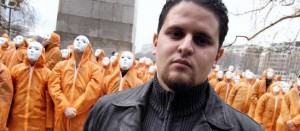It doesn’t take long for the classroom to fill up. First come the community activists and senior citizens. Then a handful of women in hijabs and sneakers. And finally, the teens in hoodies who loudly crack gum, until Mourad Benchellali sits down and starts to talk.
“I was detained in Guantanamo for two-and-a-half years,” he begins. “I had gone to Afghanistan. I was 19 years old. It was in 2001, before the attacks on the United States.”
Benchellali’s story, told at a middle school one recent evening, is one of betrayal, brutality and ultimately, a form of redemption. When he finally became a free man, in 2006, he wrote “A Journey to Hell,” a book describing his experience.
But interest in his story here only surfaced recently, as France grapples to understand the homegrown radicalism behind the Paris attacks and the hundreds of French heading to Iraq and Syria.
“The most important questions today are why are these people leaving France?” asks Mansouria Mokhefi, special advisor on the Middle East and North Africa for the French Institute for International Relations. “And above all, what has failed in France to have young people leaving for jihad?”
Benchellali believes the answers are many, mirroring the multifaceted profile of today’s radicals. “On my small level, what I can do is prevention,” he says. ‘People ask me to tell my story, and in telling it, they find some answers.”
Holiday in terrorist training camp
Benchellali’s story begins in Venissieux, a town of peeling housing projects on the outskirts of Lyon. It was here where he grew up in a family of Algerian immigrants. His father was an imam, whom French authorities considered radical, although Benchellali is not so sure.
In 2001, his oldest brother – later jailed for planning an attack on the Russian embassy in Paris – persuaded him to take a holiday in Afghanistan. Instead, Benchellali found himself at an al Qaeda training camp. Six months later, he was in Guantanamo as an “enemy combatant.”
“I was very naive,” he says, “but when I left for Afghanistan it was before September 11th, and we didn’t know anything about al Qaeda or Bin Laden.”
Today, Benchellali is 33 and back home in Venissieux. He has a haunted look and rarely makes eye contact.
His book details his torture and questioning in Guantanamo, and his subsequent incarceration in France, after being handed over to the government.
“When I got out of prison, nothing was done to help me rebuild my life,” he says of French authorities. “Nobody suggested a psychiatrist or helped me find a job.”
Moving on from hell
Today, he points to a similar dearth of solutions, beyond law-and-order ones. He cites last year’s imprisonment of a returning jihadist who spent only two weeks in Syria. “What kind of message does that send young people?” he asks. “That they can never get out of their situation. But I’m proof that you can emerge, you can reconstruct.”
Benchellali crisscrosses the country to tell his story to community groups, imams and distraught parents of young jihadis. He’s testified before a senate committee investigating jihadist cells, but he won’t be part of the government’s battle. “You have to be independent to be credible,” he says.
In Venissieux, he volunteers at a neighborhood association that helps youngsters plan a future. “Meeting Mourad is very important for young people, and not just in this neighborhood,” says the association’s project manager Quentin Bonnetaud. “He can offer them options besides the jihad.”
Analyst Mokhefi believes first-hand accounts like Benchellali’s can make a difference. But he is up against the massive propaganda machine of groups like the “Islamic State.”
“He can have an important role communicating, explaining,” she says. “But dissuading? I’m not so sure.”
Benchellali is looking beyond the immediate battle. He’s completed a program to become a trainer in bricklaying. He has a young son and ideas for new projects. He has also filed a legal complaint against Guantanamo’s ex-prison chief – although he doubts the case will ever go to trial.
“Hell is behind me,” he says. “But to be optimistic about other young people? I’m not so sure.”



